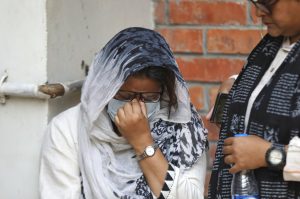By Sudha Ramachandran

Razia Rahman, wife of Faisal Arefin Deepan, breaks down after hearing the court verdict on the killing of her husband in Dhaka, Bangladesh, Wednesday, February 10, 2021 . A special tribunal in Bangladesh’s capital on Wednesday sentenced to death eight Islamic militants tied to a banned group for the 2015 killing of Deepan, a publisher of books on secularism and atheism.
Bangladesh, which has witnessed a surge in Islamist activism over the past six months, was convulsed in violence recently. Activists of the hardline Islamist Hefazat-e-Islam went on a rampage targeting government buildings, trains, Hindu temples, and the media. Over a dozen people were killed and scores of others injured in the violence and in clashes with the police.
The immediate trigger for the violence was the visit of Indian Prime Minister Narendra Modi to Dhaka; his government’s treatment of Muslims in India has angered many Bangladeshis. However, the roots of the violence lie in Bangladesh and go back several decades.
The country was born out of a tussle between secular and religious forces and while independence in 1971 marked the triumph of secular nationalism, religious forces were never defeated. Indeed, Bangladesh’s leading Islamist organization, the Jamaat-e-Islami — which was banned soon after independence for its collaboration with Pakistan and role in massacring thousands of secular Bangladeshis — was resurrected in late 1975.
In the decades since, Islamist forces gained strength, thanks to the patronage they received from civilian and military regimes.
If in previous decades it was the Jamaat that was the leading Islamist party in Bangladesh, it is the Hefazat, an umbrella grouping of ulema (Muslim scholars) that has dominated the hardline Islamist space since 2013.
The Hefazat was formed in 2010 to oppose the Awami League (AL) government’s measures to restore Bangladesh’s secular character. In 2013, when secular and atheist Bangladeshis rallied to demand the execution of Jamaat leaders convicted for war crimes committed during the 1971 Liberation War, the Hefazat countermobilized. It issued a 13-point charter of demands that included the death sentence for blasphemers, mandatory Islamic education, and a ban on intermixing of men and women and followed this up by mobilizing thousands of madrassa students for a “siege” of Dhaka.
The street power and violence that the Hefazat displayed in 2013 rattled the ruling AL. A secular-in-principle party, which had led Bangladesh’s independence struggle, the AL has been the target of religious fundamentalists for decades.
The party saw in the Hefazat a useful Islamist ally that would enable it to not only counter its main rival, the Bangladesh Nationalist Party (BNP), which is aligned to the Jamaat, but also to expand its own support among the Muslim masses. It began courting the Hefazat’s leaders and gave into some of their demands. The Hefazat responded by toning down its aggression.
However, it has resumed asserting its Islamist agenda violently over the past six months. In October 2020, its activists poured into the streets to protest against French President Emmanuel Macron’s defense of cartoon depictions of Prophet Mohammed and demanded that Bangladesh cut ties with France. A few weeks later its new leader Junaid Babunagari denounced the erection of statues as they are “against the Sharia.” Activists defaced a statue of Bangladesh’s founding father and first president, Sheikh Mujibur Rehman, soon after.
There are two reasons for the Hefazat’s heightened and violent activism in recent months. One is that following the death of its founder-leader Ahmad Shafi, a more extreme strand within the Hefazat has taken control and the organization’s leadership council is dominated by leaders close to the BNP-Jamaat alliance. Babunagari and the Hefazat’s new Secretary General Maulana Nur Hossain Kasemi are known to “have been close to the BNP in the past.”
Besides, Bangladesh is celebrating the 50th anniversary of its independence and the triumph of the secularism in the 1971 Liberation War is an important theme of the government’s marking of events. These seem to have galvanized Islamists into action against the AL government and secular Bangladeshis. Jamaat and Shibir activists are reported to be collaborating in Hefazat activities.
After years of soft handling of the Hefazat, the government has begun cracking down on the organization. Sedition charges were filed against Babunagari and other leaders following the defacing of Rahman’s statue and now several of them could face trial for the alleged murder of Shafi. Cases filed against Hefazat activists for violence in 2013 and thereafter, which had been put on the backburner, as part of the AL government’s wooing of the Islamists, have also been re-opened.
The arrest of hundreds of Islamist leaders and foot-soldiers in recent months is a setback to their activism. But it could evoke sympathy for them among Muslim masses. It could also prompt a coming together of Islamist organizations.
No comments:
Post a Comment